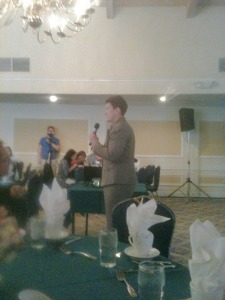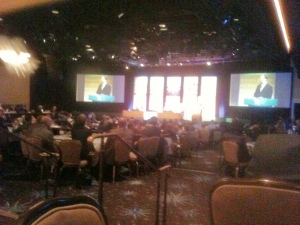 October 26, 2010
October 26, 2010
Dear Colleagues:
I am writing to share with you the recommendations I plan to discuss in November with the UC Board of Regents about changes to the University’s post-employment benefits programs.
When I established the Post Employment Benefits Task Force, I made clear that the proposed changes needed to satisfy two critical objectives: Help address our financial challenges, and preserve good post employment benefits in support of UC’s commitment to excellence and in recognition of the vital role our faculty and staff play in the quality and delivery of UC’s service to the public. I believe these recommendations achieve th0se goals.
As you know, for the past two months senior UC leaders and I have been engaged in extensive discussions with faculty, staff and administrators about how to ensure the financial sustainability of UC’s retiree health and pension programs while still providing attractive retirement benefits.
Those discussions are continuing, but the feedback we’ve received to date has been very consistent, particularly as it relates to the design of a pension tier for future faculty and staff.
My recommendations – which have the support of the chair and vice-chair of the Academic Senate, UC’s Staff Advisors to the Regents, and leadership of the Council of UC Staff Assemblies – reflect that feedback.
In short, I am proposing a new pension program for future employees hired after July 1, 2013 that will preserve good pension benefits while also reducing UC’s long-term costs. Many elements are similar to the current UCRP program, including:
- A defined benefit or “pension” plan;
- A five-year vesting period;
- A pension benefit formula based on an employee’s highest average compensation over 36 months; and
- A maximum pension benefit equal to 100 percent of an employee’s working salary.
There are also some distinct differences that make it a more conservative pension plan than the State of California offers its employees, including proposals to raise the minimum retirement age from 50 to 55 and the retirement age for maximum pension benefits from 60 to 65.
I will also recommend that we no longer subsidize survivor benefits and that we eliminate the option of a lump sum cash out.
This recommendation does not affect pension benefits for current UC employees, or those hired between now and July 1, 2013 – only future employees.
The annual cost to UC and its future employees for this proposed new pension program is 15.1 percent of annual payroll, 2.5 percent lower than the 17.6 percent that our current UCRP pension program costs UC and its faculty and staff.
New employees and UC will together pay the full 15.1 percent cost of the new plan, with future faculty and staff contributing 7 percent of annual pay and UC paying 8.1 percent.
I think this is a very fair and balanced approach, and one that, if adopted by the Regents, will allow UC’s retirement benefits to continue to be an important component in attracting and retaining excellent faculty and staff.
Although the new pension tier would affect future employees, I will also recommend changes to our retiree health program that will directly affect current faculty and staff.
Most notably, I will propose that the Regents adopt in full the recommendations from the Post-Employment Benefits Task Force on changes to our retiree health program including:
- Reduce UC’s contribution to retiree health premiums over time to a floor of 70 percent;
- Change retiree health care eligibility rules, effective July 2013, so that UC’s contributions to retiree health care premiums are offered on a graduated scale based on years of service and employee age at retirement;
- Allow faculty and staff to remain under the current retiree health care eligibility rules if, on July 1, 2013, they have five years of UCRP service credit and their age and years of UC service together equal 50 or greater.
I will also recommend a course of action to erase the UC Retirement Plan’s $12.9 billion unfunded liability.
One of the most important components of that plan requires UC to increase its annual contributions to the UCRP by 2 percent per year, until UC is contributing roughly 20 percent of annual payroll to UCRP.
There is no question that without state funding support, it will be difficult for UC to find the resources necessary to contribute such a large amount to the UCRP each year. But given the size of our current unfunded pension liability, it is essential that we find a way to do so.
Although the state has not yet agreed to pay its share of the UCRP, we have made some important strides on that issue this year, and we will continue to press our case in Sacramento. In the meantime, we must take sensible action now to address our unfunded liability.
The Regents will hear and discuss my proposals at their board meeting in November, and will possibly take action at a special meeting in December. The full details on my recommendation will be contained in a Regents item that will be available in early November.
In closing, I want to thank you for your thoughtful input and suggestions on these difficult issues. And I encourage you to stay involved. Together we are doing the hard work that is essential to preserving this great institution.
With best wishes, I am,
Sincerely yours,
Mark G. Yudof
From http://universityofcalifornia.edu/sites/ucrpfuture/news-updates/president-yudof-proposed-changes-to-retirement-benefits/#more-911








